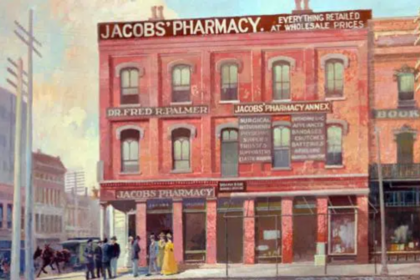
Why is Coca-Cola a super successful company even though its main product does not solve any world problem?
The question caught my attention for two reasons:
- Much of the world seems misled to perceive that startups and technology go hand in hand, as though something can’t be a startup unless it is in tech.
- Too many founders are misled to believe that their venture should be focused on an idea solving a specific problem.
How ever can it be that Coca-Cola, Tito’s from Austin, Red Bull, or any other non-tech venture would be a startup disruptive and innovative?? How does a drink solve problems in the world?
On May 8, 1886, Dr. John Pemberton sold the first glass of Coca-Cola at Jacobs’ Pharmacy in downtown Atlanta. A startup in 1886, we’re today too easily led to believe startups are a result of Silicon Valley, Venture Capital, or the innovations of electronics or The Information Age. Arguably, Silicon Valley’s first startup was in fashion, thanks to a man by the name of Strauss in 1848.
A local pharmacist, Dr. Pemberton, produced the syrup for Coca-Cola and carried a jug of the new product down the street to Jacobs’ Pharmacy, where it was sampled, pronounced “excellent” and placed on sale for five cents a glass as a soda fountain drink. Carbonated water was teamed with the new syrup to produce a drink that was at once “Delicious and Refreshing,” a theme that continues to echo today wherever Coca-Cola is enjoyed.
Innovation.
Thinking that “the two Cs would look well in advertising,” Dr. Pemberton’s partner and bookkeeper, Frank M. Robinson, suggested the name and penned the now famous trademark “Coca-Cola” in his unique script. The first newspaper ad for Coca-Cola soon appeared in The Atlanta Journal, inviting thirsty citizens to try “the new and popular soda fountain drink.” Hand-painted oilcloth signs reading “Coca-Cola” appeared on store awnings, with the suggestion “Drink” added to inform passer by that the new beverage was for soda fountain refreshment.
Marketing.
Later observed to be the most valuable things a venture does, economist Peter Drucker argued in the 1970s, “Because the purpose of business is to create a customer, the business enterprise has two–and only two–basic functions: marketing and innovation. Marketing and innovation produce results; all the rest are costs. Marketing is the distinguishing, unique function of the business.”
It’s from this startup that Coca-Cola didn’t just invent and sell a beverage, they truly launched a venture that would go on to change the world, by being founders who, perhaps unintentionally, prioritized the most valuable things YOU should be doing: being innovative and marketing.
Startups, notably, aren’t new businesses ready to sell a product, and they aren’t dependent on tech. I think Steve Blank characterizes them best, According to Steve Blank, a startup is a “temporary organization designed to search for a repeatable and scalable business model.”
I build and run incubators for cities because the process of searching for that repeatable and scalable business model is itself repeatable and scalable. It’s teachable, as long as it is recognized that it is NOT teaching how to start a business nor be an entrepreneur, it’s teaching the process of turning your temporary venture into a sustainable, competitive, and valuable company.
If you can impact the life of one person, you change the world.
One person, not everyone’s problem.
Despite the challenges of corn syrup in Coca-Cola *today* or the big gulp 64-ounce cup with free refills, Coca-Cola was once a startup like any other. What problem did they tackle?
Well, we can’t say for certain so let’s just spitball:
- Life back then was pretty bland with water or tea, maybe lemonade; a pretty limited set of options with which to experience a little enjoyment.
- Or what about the affordability of soda drinks? Before mass-produced soft drinks, soda was either concocted by a pharmacy or mixed by a soda jerk. It was, relatively speaking, costly.
- Or maybe another way to look at it entirely, the consumer isn’t the problem solved… the U.S. has an incredible supply of inexpensive Coca (or whatever is in the drink) and trade partners who want to supply more of their stable crop. But no one knows what to do with all those extra ingredients sitting in warehouses.
- What about the problems of delivery, mass production, or refrigeration, or bottling…?
In any one of those cases, there is a problem to solve. And with just one or some who agree, and pay for solutions, we have a company that creates value through innovation. And that company MAY merely supply Coca-Cola as a way to make money solving the other problems they’re tackling.
That’s critical for Startup Founders to appreciate (and few do); that how you make money, how you succeed, and how you grow, may have nothing to do with what customers actually want or need. The notorious Problem/Solution Statement in startup communities is grossly misunderstood. There is nothing about it that means you must be in business because: there is a customer, that they have a problem, and you have the solution.
Entrepreneurs and startups are in the business of NEW solutions. Meaning, they compete and create value not by solving that obvious problem people have, but by always solving various problems in better ways, so as to exist.
Maybe the founder just sold Coca-Cola because he wanted to and enjoyed it. And so too did people who would pay for it.
Maybe the problem solved is that people were simply thirsty, and that bottled cola was a better option than water.
Coincidentally, a study was just released showing that, in fact, Coca-Cola is better at hydration than water. For real. “Which drink is best for hydration? Hint: It isn’t water“
So maybe the problem solved, unexpectedly, is that people needed a better means of hydration.
I don’t think that’s the case … and I’m pretty sure from my recollection of the history of Coke, it probably was just a drink popularized because people wanted it.
And thus, the reality of being a successful company: they aren’t in the business of seeing a problem and solving it… they’re in the business of addressing many problems, more effectively and efficiently than others; marketing to determine how and where to do that. And in the process, their product or revenue model might be nothing more than a means to that end.
[Image via The Birth of a Refreshing Idea Coca-Cola History]





So maybe the problem solved, unexpectedly, is that people needed a better means of hydration.
I’ve heard a writer once making the argument that Coca-cola is used as a safe substitute for scarce potable drinking water for billions of people. You might not be able to find clean water for sale in bodegas by the roadside in really remote underdeveloped places, but odds are you can find a can of coke. Perhaps less true in recent era after bottled water started being sold globally, but Coke’s been around globally since long before.
YES! Precisely how to think about it. That, we’re not necessarily solving the problem of those we set out certain we’re supporting; this is WHY startup founders must be constantly marketing and capable of pivoting – discover, learn, validate, and change.
Well written and informative Paul O’Brien – now to get the corn syrup out of it
Thanks, Paul. You have given me a new mantra for our company, “the business enterprise has two–and only two–basic functions: marketing and innovation.”
Actually never understood why investors are so crazy about startups solving problems. The biggest companies in the world never solved a problem, they just make life easier or more fun – Netflix hasn’t solved a problem, they just made entertainment easier to access. But that was not a problem – we were happy before as well and no one saw it as a problem to not have streaming, since we didn’t know what it is :D. Amazon hasn’t solved a problem, they just made life easier.
that’s not true. Evident in the article. Netflix saw that driving to Blockbuster and selecting from a limited supply of dvds, could be improved upon with their original service. That’s a handful of problems overcome: driving to rent movies, real estate being used to House DVDs, not being able to get any movie you want.
They’ve been overcame the problem of large library of movies being available for streaming.
Investors are crazy about solving problems because venture capital invests not in sustainable existing businesses, you can do that as a private investor or through Wall Street, but by investing in highly risky startups, most of which will fail, therefore needing those that succeed to deliver exceptional returns on investment: to potentially be the most valuable things that exist.
Merely solving the problem is putting a restaurant where one doesn’t exist but is desired. That’s not what venture capitalist funded startups.
Venture capitalists seek startups that indeed are overcoming a problem, but do so through being innovative and doing the marketing to determine what substantial opportunities can be realized.
Paul O’Brien Understand. So investors want startups to solve problems that no one would call a problem – no one had a problem buying Blu-rays and and renting DVDs (which was actually very profitable for Hollywood), Netflix was just a little more convenient. But I guess I understand what you mean – personally I like to think in opportunities, not problems which is a negative term.
Benjamin Kratsch pretty sure I’m not the only one who drove to Blockbuster to get that movie I wanted to see, only to find it not available.
You’re attempting to claim that problems are only those you deem socially impactful or something?
I agree with opportunity terms. Opportunities that exist in problems easily overcome are what businesses address. Opportunities that startups seek to overcome are more substantial and require innovation.
Paul O’Brien Ah no, I just would not call them problems but I guess that’s a question of definition :O)
Netflix for me was a natural evolution of digitizing content in an era where we digitize everything – newspapers, magazines, music, now tv shows and movies.
Benjamin Kratsch now we’re speaking the same language ??
Thanks Paul O’Brien. Our experience is that it is hard enough to fully define and understand the vision you have, let alone explain it and make it clear to other people, too!
We sometimes feel the need to detach from this problem-solving obsession which is so common to entrepreneurs, and just embrace the beauty of having one mission in mind and doing whatever it takes to turn it into reality.
Our company didn’t necessarily start from a ‘tech’ solution, rather we (happily, and proudly) found it in our vision. What’s for sure is that we have the passion to push that vision forward, and we’re having a great time along the way!
“Solving a problem” is correct unless you have an alternate explanation?
[…] Coca-Cola comes to mind as a great example of our upper left plot; exemplifying how exceptional marketing establishes what you’re doing to exceptional success. […]
[…] among the most meaningful examples of why “startup” doesn’t mean code and semiconductor but does mean innovation. Bangkok’s Siriraj Hospital performed early dialysis treatments and expanded nephrology rapidly, […]